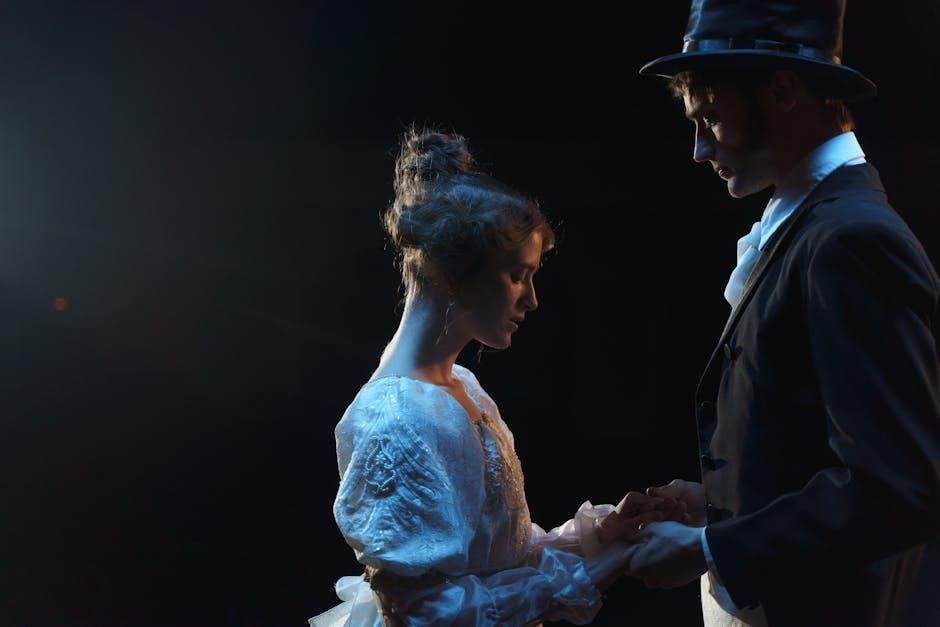Macbeth Act 1 introduces the dark prophecies of the three witches‚ Macbeth’s ambition‚ and the moral conflict that drives the play’s tragic events‚ setting the stage for Shakespeare’s masterpiece.
1.1. Overview of Act 1 in Macbeth
Act 1 of Macbeth introduces the witches’ prophecies‚ Macbeth’s rise as a warrior‚ and the seeds of ambition planted in him. The act establishes the supernatural tone‚ Macbeth’s internal conflict‚ and Lady Macbeth’s influence‚ setting the stage for the tragic events that unfold‚ with key scenes like the witches’ meeting and Duncan’s decision to visit Macbeth’s castle.
1.2. Key Themes Introduced in Act 1
Act 1 introduces themes of ambition‚ the supernatural‚ and moral conflict. The witches’ prophecies ignite Macbeth’s desire for power‚ while Lady Macbeth’s ruthless determination highlights the destructive nature of unchecked ambition. The struggle between good and evil is evident‚ setting the tone for the play’s exploration of guilt‚ fate‚ and the corrupting influence of power‚ which drives the tragic events forward.
The Three Witches and Their Prophecies
The witches foresee Macbeth as Thane of Cawdor and future king‚ sparking his ambition. Their prophecies also reveal Banquo’s lineage will reign‚ fueling Macbeth’s darker desires.
2.1. The Witches’ Prophecies and Their Impact on Macbeth
The witches’ prophecies in Act 1 ignite Macbeth’s ambition‚ making him envision kingship. Their words plant seeds of doubt and desire‚ influencing his decisions and setting the tragic events in motion. The prophecies not only alter Macbeth’s perception of his destiny but also create a sense of inevitability‚ driving him toward his dark fate.
2.2. The Role of the Supernatural in Act 1
The supernatural elements in Act 1‚ particularly the three witches‚ create a mysterious and ominous atmosphere. Their prophecies and chants introduce the theme of fate vs. free will‚ influencing Macbeth and Banquo. The witches’ presence sets the tone for the dark and tragic events that unfold‚ emphasizing the unnatural and eerie forces at play in the story.

Macbeth’s First Encounter with the Witches
Macbeth’s first meeting with the witches occurs in a desert place amid thunder and lightning‚ where they prophesize his future‚ sparking his ambition and curiosity about destiny.
3.1. The Meeting in the Desert Place
In a desolate‚ stormy landscape‚ Macbeth and Banquo encounter three witches who foretell Macbeth’s rise to power‚ initiating the events that will unravel his fate and ambition‚ as documented in various PDF analyses of Macbeth Act 1.
3.2. Macbeth’s Reaction to the Prophecies
Macbeth‚ initially confident in his honor‚ is deeply unsettled by the witches’ prophecies. His ambition is sparked‚ but fear and moral uncertainty emerge‚ as he contemplates the possibility of murdering King Duncan‚ revealing the internal conflict that defines his character in Act 1‚ as analyzed in various PDF summaries of the play.

Lady Macbeth and Her Ambition
Lady Macbeth emerges as a pivotal figure‚ driving Macbeth’s ambition with cunning and ruthless persuasion‚ embodying the destructive power of unchecked desire in Act 1.
4.1. Lady Macbeth’s Character in Act 1
Lady Macbeth is portrayed as a strong-willed‚ ambitious‚ and manipulative figure in Act 1. Her determination to push Macbeth toward the throne reveals her ruthless nature and deep-seated desire for power. She challenges Macbeth’s hesitation‚ showcasing her ability to influence his decisions‚ making her a central force in the play’s unfolding tragedy.
4.2. Lady Macbeth’s Persuasion of Macbeth
Lady Macbeth skillfully manipulates Macbeth‚ using guilt and emasculation to override his moral hesitation. She questions his courage‚ urging him to commit regicide‚ and her persuasive tactics highlight her dominance. Her relentless pressure ultimately sways Macbeth‚ showcasing her influence and ambition‚ which propels the plot toward the tragic events of the play.
King Duncan’s Decision to Visit Macbeth
King Duncan’s decision to visit Macbeth’s castle stems from trust and gratitude‚ as he names Macbeth Thane of Cawdor‚ unaware of the impending tragedy this visit will unleash.
5.1. Duncan’s Trust in Macbeth
Duncan’s trust in Macbeth is evident as he rewards Macbeth with the title of Thane of Cawdor‚ showcasing his faith in Macbeth’s loyalty and valor. This trust is rooted in Macbeth’s military victories and perceived nobility‚ making Duncan oblivious to the impending betrayal. The king’s decision highlights the tragic irony of Macbeth’s subsequent actions.
5.2. The Significance of Duncan’s Visit to Macbeth’s Castle
Duncan’s visit to Macbeth’s castle sets the stage for the play’s tragic events‚ as it provides the opportunity for Lady Macbeth to orchestrate the king’s murder. This visit symbolizes trust and honor‚ but it also triggers Macbeth’s ambition‚ leading to the betrayal that reshapes Scotland’s fate. The castle becomes a symbol of both hospitality and impending doom.
Macbeth’s Internal Conflict
Macbeth’s internal conflict arises from his ambition clashing with his morality‚ creating a psychological turmoil that drives the plot and defines his tragic character development.
6.1. Macbeth’s Soliloquy in Act 1‚ Scene 7
Macbeth’s soliloquy in Act 1‚ Scene 7‚ reveals his profound internal struggle. He debates the morality of killing King Duncan‚ weighing ambition against conscience. The soliloquy showcases Shakespeare’s mastery of psychological depth‚ as Macbeth grapples with guilt and the consequences of his actions. This pivotal moment highlights the tragic hero’s vulnerability and sets the tone for his downward spiral into darkness and tyranny.
6.2. The Struggle Between Ambition and Morality
The struggle between ambition and morality is a central theme in Act 1. Macbeth’s desire for power‚ fueled by the witches’ prophecies‚ clashes with his moral values. Lady Macbeth’s persuasion further ignites his ambition‚ leading him to contemplate regicide. This internal conflict reveals the tragic tension between personal gain and ethical principles‚ setting the stage for Macbeth’s eventual downfall and the play’s dark consequences.
The Theme of Ambition vs. Morality
The theme of ambition vs. morality in Act 1 explores Macbeth’s rise and fall. His desire for power‚ fueled by prophecies and Lady Macbeth‚ sparks a moral conflict‚ leading to tragic consequences and revealing the destructive nature of unchecked ambition and its impact on humanity.
7.1. The Corrupting Influence of Ambition
Ambition‚ once a noble trait‚ becomes a corrupting force in Macbeth. The witches’ prophecies ignite his desire for power‚ transforming him from a loyal warrior to a man willing to commit regicide. Lady Macbeth’s relentless persuasion further fuels his ambition‚ as seen in her goading him to act. This relentless pursuit of power erodes Macbeth’s morality‚ highlighting the destructive nature of unchecked ambition and its devastating consequences on both individuals and society.
7.2. The Moral Dilemma in Act 1
Macbeth’s internal conflict in Act 1 reveals a profound moral dilemma. His ambition to become king clashes with his conscience‚ as he grapples with the immorality of murdering King Duncan. This struggle is evident in his soliloquy‚ where he weighs the consequences of his actions‚ showcasing the tension between his desire for power and his moral principles‚ setting the stage for the tragedy.

The Structure of Act 1
Act 1 of Macbeth expertly establishes the play’s foundation‚ introducing the witches’ prophecies‚ Macbeth’s ambition‚ and Duncan’s fateful decision‚ setting the stage for the ensuing tragedy.
8.1. Key Scenes and Their Purposes
Act 1’s key scenes include the witches’ meeting‚ Duncan’s camp‚ the prophecy‚ Lady Macbeth’s persuasion‚ and Macbeth’s soliloquy. These scenes introduce themes‚ establish characters‚ and build tension‚ setting the stage for the tragic events that unfold‚ while highlighting the supernatural‚ ambition‚ and moral conflict central to the play’s narrative structure and dramatic progression.
Act 1 builds tension through the witches’ prophecies‚ Duncan’s decision to visit Macbeth‚ and Lady Macbeth’s relentless persuasion. Macbeth’s internal conflict intensifies‚ culminating in his soliloquy‚ where he grapples with morality versus ambition. These elements create a dramatic escalation‚ leading to the act’s climax‚ which sets the stage for the tragic events that will unfold in the play.
Key Quotes from Act 1
8.2. The Build-Up to the Climax of Act 1
The witches’ prophecies and Duncan’s announcement ignite Macbeth’s ambition. Lady Macbeth’s persuasion and Macbeth’s soliloquy reveal his internal struggle. These events culminate in a tense climax‚ setting the stage for the tragic events that follow in Act 1 of Macbeth.
9.1. Macbeth’s Famous Soliloquy
Macbeth’s soliloquy in Act 1‚ Scene 7‚ reveals his internal conflict. He grapples with ambition and morality‚ contemplating the consequences of killing King Duncan. His famous lines‚ “If it were done when ’tis done‚” reflect his hesitation and fear of guilt. This soliloquy highlights his psychological turmoil‚ showcasing Shakespeare’s masterful portrayal of a tragic hero’s inner struggle‚ setting the stage for his inevitable downfall. The soliloquy is a pivotal moment in Act 1‚ emphasizing Macbeth’s complexity and the play’s themes of ambition and conscience. It remains one of Shakespeare’s most iconic passages‚ illustrating the human capacity for both good and evil. The soliloquy’s language‚ rich in metaphor and emotional depth‚ underscores Macbeth’s mental state and foreshadows the tragedy that unfolds. This moment is crucial in understanding Macbeth’s transformation from a noble warrior to a guilt-ridden king‚ driven by his own dark desires. The soliloquy not only advances the plot but also deepens the audience’s understanding of Macbeth’s psyche‚ making it a cornerstone of the play’s dramatic tension. Furthermore‚ the soliloquy serves as a bridge between Macbeth’s initial hesitation and his ultimate decision to commit the murder‚ showcasing his vulnerability and the destructive power of unchecked ambition. By exploring Macbeth’s thoughts and emotions‚ the soliloquy provides insight into the human condition‚ making it a timeless and universal element of the play. The soliloquy’s impact is further amplified by its contrast with Lady Macbeth’s ruthless determination‚ highlighting the differences in their approaches to achieving power. Ultimately‚ Macbeth’s soliloquy in Act 1‚ Scene 7‚ is a profound exploration of morality‚ ambition‚ and the complexities of human nature‚ cementing its place as one of literature’s most celebrated passages. The soliloquy’s themes and language continue to resonate with audiences‚ offering a deeper understanding of Macbeth’s tragic journey and the enduring relevance of Shakespeare’s work. The soliloquy remains a critical focus for scholars and performers‚ as it encapsulates the essence of Macbeth’s internal conflict and the play’s overarching themes. By examining this soliloquy‚ readers gain a richer understanding of Shakespeare’s craftsmanship and the psychological depth of his characters. The soliloquy’s exploration of guilt‚ fear‚ and ambition continues to captivate audiences‚ making it a fundamental element of Act 1 and the play as a whole. In conclusion‚ Macbeth’s soliloquy is a masterful depiction of a man torn between his aspirations and his conscience‚ providing a compelling insight into the human experience.
9.2. Lady Macbeth’s Notable Lines
Lady Macbeth’s notable lines in Act 1 reveal her ruthless ambition and manipulation. Her famous speech‚ “Come‚ you spirits…unsex me here‚” showcases her desire to shed femininity for power. She goads Macbeth‚ saying‚ “When you durst do it‚ then you were a man.” Her words highlight her strength and dark determination‚ driving the plot’s tragic momentum and illustrating her complex‚ flawed character. Her lines underscore her role as a catalyst for Macbeth’s downfall‚ blending cunning with emotional depth. Lady Macbeth’s dialogue in Act 1‚ particularly her persuasion of Macbeth‚ remains iconic‚ reflecting her inner turmoil and the moral ambiguity of their actions. Her language‚ sharp and commanding‚ contrasts with Macbeth’s hesitancy‚ emphasizing her dominance in their relationship. These lines are central to understanding her character and the play’s exploration of ambition and guilt. Lady Macbeth’s speeches in Act 1‚ filled with intensity and calculation‚ set the tone for her eventual unraveling‚ making her one of Shakespeare’s most compelling female characters. Her words not only advance the plot but also reveal her psychological complexity‚ adding depth to the tragedy. Lady Macbeth’s notable lines in Act 1 are a testament to Shakespeare’s skill in crafting multifaceted characters‚ ensuring her legacy as a literary icon. Her dialogue continues to captivate audiences‚ offering insights into the destructive power of unchecked ambition and the enduring themes of the play. Lady Macbeth’s lines in Act 1 remain a focal point for analysis‚ highlighting her pivotal role in the tragedy and her lasting impact on literary history.

Historical and Cultural Context
Macbeth is rooted in Scottish history and folklore‚ influenced by King James I’s belief in witchcraft. Shakespeare drew inspiration from real events and cultural superstitions‚ crafting a timeless tragedy.
10.1. Shakespeare’s Sources for Macbeth
Shakespeare drew inspiration from historical accounts of King James I and Scottish folklore. The story of Macbeth is based on real events‚ blending history with supernatural elements to create a compelling narrative. Sources include Holinshed’s Chronicles‚ which provided details about Macbeth’s rise and fall‚ and the cultural beliefs of the time‚ enriching the play’s themes and characters.
10.2. The Relevance of Act 1 in Modern Interpretations
Act 1 of Macbeth remains highly relevant in modern interpretations due to its exploration of universal themes like ambition‚ power‚ and moral conflict. The witches’ prophecies and Macbeth’s internal struggles resonate with contemporary audiences‚ offering insights into human psychology. Modern adaptations and analyses continue to draw from Act 1‚ making it a cornerstone of both academic and theatrical exploration of Shakespeare’s timeless work.
Act 1 of Macbeth masterfully introduces themes of ambition and fate‚ setting the stage for the tragic events that unfold‚ shaping the play’s enduring legacy.
11.1. The Significance of Act 1 in the Play
Act 1 of Macbeth is crucial as it establishes the core themes of ambition‚ fate‚ and morality. The witches’ prophecies ignite Macbeth’s desire for power‚ while Lady Macbeth’s persuasion deepens the plot. King Duncan’s decision to visit Macbeth’s castle sets the stage for the tragic events. This act introduces key characters and their motivations‚ laying the groundwork for the play’s exploration of human nature and the consequences of unchecked ambition.
11.2. How Act 1 Sets the Stage for the Tragedy
Act 1 establishes the foundation for the tragedy by introducing the witches’ prophecies‚ Macbeth’s ambition‚ and Lady Macbeth’s ruthless persuasion. King Duncan’s decision to visit Macbeth’s castle creates the opportunity for the murder‚ while Macbeth’s internal conflict reveals his moral vulnerability. These elements intertwine to set the stage for a downward spiral of guilt‚ paranoia‚ and destruction‚ ultimately leading to the play’s tragic conclusion.
